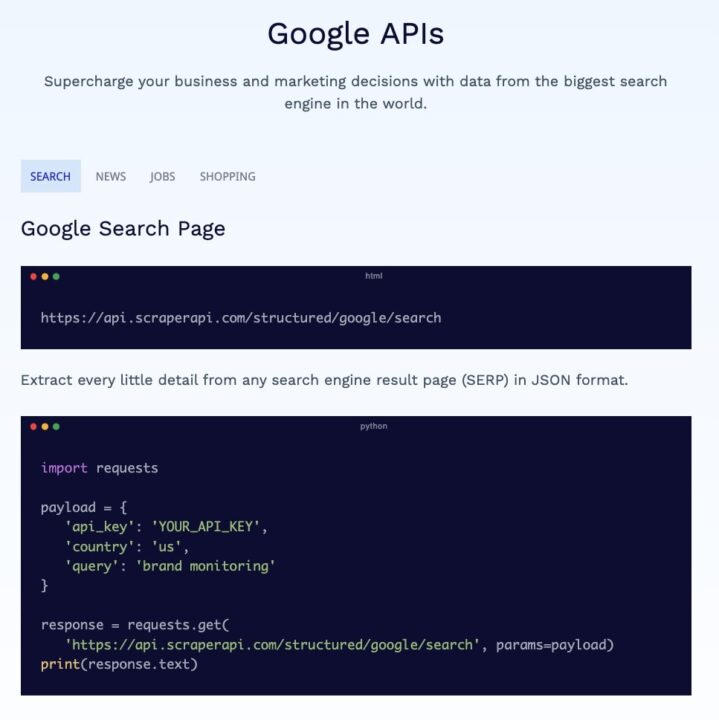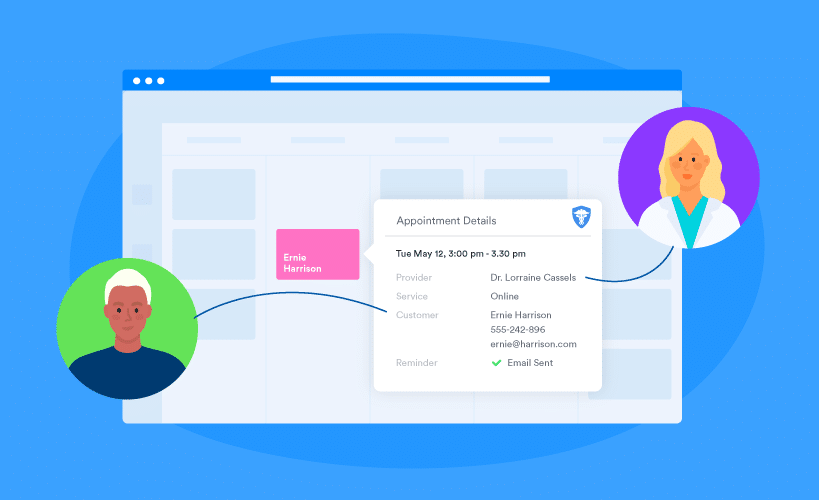Search Engine APIs are crucial for web developers. They help fetch and manage data efficiently.
In today’s digital age, accessing and processing information quickly is key. Search Engine APIs come in handy for this purpose. They allow developers to integrate search engine capabilities into their applications. Whether you run a blog, an e-commerce site, or a large-scale web service, these APIs can significantly enhance your user experience.
They provide real-time data, improve search functionalities, and streamline data management tasks. Understanding the best options available can save you time and effort. In this blog post, we will explore the top Search Engine APIs. This guide will help you choose the right one for your needs. Let’s dive in!
Introduction To Search Engine Apis
Search Engine APIs are essential tools that help developers integrate search functionalities into their applications. Imagine effortlessly adding Google search capabilities to your app or website. That’s the power of Search Engine APIs.
These APIs fetch search results from a search engine and display them wherever you need. This makes your app or website more functional and user-friendly. Let’s delve into why Search Engine APIs are important and how they’ve evolved over time.
Importance Of Search Engine Apis
Search Engine APIs save you time and effort. Instead of building a search feature from scratch, you can leverage existing technologies.
They provide accurate and relevant search results. Users can quickly find the information they need, improving their experience.
APIs also allow customization. You can tweak the search results to better match your users’ needs.
Imagine running an e-commerce site. A powerful search function can help your customers find products faster, leading to more sales.
Evolution Of Search Technology
Search technology has come a long way. In the early days, search engines were slow and often returned irrelevant results.
Today, they use advanced algorithms and machine learning to deliver precise results. This evolution has been driven by the need for better user experiences.
APIs have also evolved. They now offer features like voice search, image search, and even personalized results.
Think about how Google Search has improved over the years. The same improvements are available to you through Search Engine APIs.
Have you considered how a Search Engine API could enhance your application? Imagine the possibilities and take the next step in optimizing your user experience.
Key Features Of Top Search Engine Apis
When choosing the best search engine API, understanding its key features is crucial. These features determine how well the API can meet your specific needs and enhance your projects. Let’s dive into some of the standout characteristics of top search engine APIs.
Advanced Query Capabilities
A top-tier search engine API should offer advanced query capabilities. This means it can handle complex search queries efficiently.
Imagine you want to filter search results based on multiple criteria like date, location, or specific keywords. An API with advanced query capabilities makes this task seamless.
Such features save you time and effort, allowing you to focus on analyzing the results rather than crafting perfect queries.
Real-time Data Processing
Real-time data processing is another essential feature. This allows the API to provide up-to-date information instantly.
If you are monitoring trends or tracking social media mentions, real-time data processing ensures you get the most current data. This can be a game-changer for staying ahead in fast-paced industries.
Think about the last time you needed immediate information. Did the tool you used provide it quickly? If not, a search engine API with real-time data processing would be a significant upgrade.
Ultimately, these features enhance the functionality and efficiency of search engine APIs. They provide the tools necessary to handle complex queries and offer real-time insights. What features do you find most important in a search engine API?
Comparing Popular Search Engine Apis
When it comes to harnessing the power of search engines, APIs (Application Programming Interfaces) can be incredibly useful. They allow you to integrate search functionalities directly into your applications, providing users with real-time, relevant information. But with so many options available, how do you choose the best one? Let’s compare some of the most popular Search Engine APIs: Google Custom Search API and Bing Search API.
Google Custom Search Api
Google Custom Search API is a powerful tool that allows you to add a search engine to your website quickly. With Google’s vast index, you can provide users with highly relevant search results.
One of the standout features is the ability to customize the look and feel of the search results. You can tailor it to match your website’s design seamlessly. Additionally, Google’s API supports various languages, making it a versatile option for a global audience.
However, it’s essential to note that the Google Custom Search API has usage limits. You need to manage your queries effectively to avoid hitting the cap. So, if your website experiences high traffic, you might need to consider this limitation.
Bing Search Api
The Bing Search API is another robust option for integrating search capabilities into your applications. It offers a wide range of search types, including web, image, video, and news searches.
Bing’s API is known for its speed and reliability. It provides quick responses, making it ideal for applications that require real-time data. Also, it includes features like spelling suggestions and related searches, enhancing the user experience.
One notable advantage of Bing Search API is its flexible pricing model. You can choose from different tiers based on your needs, which can be more cost-effective for smaller projects. But, be aware that its search index might not be as extensive as Google’s, which could impact the comprehensiveness of your search results.
Both Google Custom Search API and Bing Search API have their strengths and weaknesses. Your choice will depend on your specific needs, such as customization options, global reach, speed, and budget.
Have you used any of these APIs? What was your experience? Share your thoughts in the comments below!

Credit: scrapingrobot.com
Criteria For Evaluating Search Engine Apis
Choosing the best search engine API requires careful consideration. These tools help developers integrate powerful search functionalities into their applications. To ensure you select the right API, focus on key criteria. Below are some important factors to evaluate.
Accuracy And Relevance
The accuracy of search results is crucial. Users expect precise answers to their queries. An effective search engine API must provide relevant results. It should also filter out irrelevant information. Accuracy is determined by how well the API understands the user’s intent. Relevance depends on the quality of the data it processes.
Scalability And Performance
Scalability refers to the API’s ability to handle growing amounts of data. As your application grows, the API must perform well under increased load. Performance involves the speed and efficiency of the search process. A good API should respond quickly to queries. It must also maintain stability during peak usage times.
Integrating Search Engine Apis
Integrating Search Engine APIs into your application can significantly enhance its functionality. Whether you’re building a complex search feature or a simple keyword lookup, these APIs provide robust tools to fetch and display search results. Let’s dive into the basics of implementation, common challenges, and practical tips for a seamless integration.
Implementation Basics
Understanding how to implement a Search Engine API is your first step. Begin by selecting an API that fits your needs. Popular options include Google Custom Search, Bing Search API, and Elasticsearch.
Once you’ve chosen an API, the next step is to get your API key. This is usually available in the developer section of the service provider’s website. Keep this key secure, as it’s crucial for accessing the API.
Next, integrate the API into your application. If you’re using JavaScript, this typically involves making an AJAX request. For Python, you might use libraries like Requests to send HTTP requests and handle responses. Here’s a simple example in JavaScript:
fetch('https://api.example.com/search?q=yourQuery&key=yourAPIKey')
.then(response => response.json())
.then(data => console.log(data));
Test your implementation thoroughly to ensure it works as expected. This includes checking for different query inputs and handling errors gracefully.
Common Challenges
Integrating Search Engine APIs can come with its own set of challenges. Rate limiting is a common issue. Most APIs have a limit on the number of requests you can make per day. Plan accordingly to avoid disruption.
Another challenge is handling errors. What happens if the API service is down, or the response is not as expected? Implement robust error handling to manage such scenarios. For instance, log errors and provide user-friendly messages instead of just displaying an error code.
Data formatting can also be tricky. APIs often return data in JSON or XML formats, which you need to parse and display correctly. This involves understanding the structure of the API response and mapping it to your application’s UI.
Lastly, consider security. Never expose your API key in client-side code. Use server-side proxies if necessary to keep your credentials secure.
Have you encountered any specific issues while integrating APIs? Share your experiences and insights in the comments below. By addressing these challenges head-on, you’ll create a more reliable and efficient search feature for your users.
Enhancing User Experience With Search Apis
Enhancing user experience with search APIs can significantly boost your website’s functionality. These APIs offer various features to cater to diverse user needs. They can deliver personalized search results and integrate with voice search, making the process seamless and intuitive.
Personalized Search Results
Personalized search results adapt to user preferences. By analyzing user behavior, search APIs can offer tailored content. This increases relevance and satisfaction. Users find what they need faster. This improves their experience and keeps them engaged.
Voice Search Integration
Voice search is becoming more popular. Search APIs can integrate voice search capabilities. This allows users to find information using voice commands. It’s convenient and hands-free. Perfect for mobile and smart devices. Enhancing user experience in a significant way.
Security And Privacy Considerations
When choosing the best search engine API, security and privacy considerations are critical. Ensuring data protection and compliance with regulations is essential. Let’s explore these aspects in detail.
Data Protection Measures
Search engine APIs must use encryption to protect data during transmission. End-to-end encryption prevents unauthorized access. Regular security audits are also necessary. These audits identify and address vulnerabilities promptly.
APIs should implement strict authentication methods. Examples include OAuth and API keys. This ensures only authorized users access the data. Robust access controls are vital. They restrict sensitive data access to only those who need it.
Compliance With Regulations
APIs must comply with data protection regulations. Examples are GDPR and CCPA. Non-compliance can lead to severe penalties. Ensure the API provider follows these laws. They must handle user data responsibly.
Providers should be transparent about their data practices. They must inform users how their data is collected, stored, and used. This builds trust and ensures compliance with privacy laws. Choose an API that prioritizes security and privacy.

Credit: zenserp.com
Future Trends In Search Engine Apis
The future of search engine APIs is full of exciting possibilities. Innovations in technology will shape how we interact with search engines. This will lead to more accurate and relevant results. Two major trends are set to dominate the landscape: AI and machine learning, and contextual search innovations.
Ai And Machine Learning
AI and machine learning are transforming search engine APIs. These technologies help improve search accuracy. They analyze user behavior and search patterns. AI learns from data to provide better results over time. Machine learning models predict what users want before they finish typing. This results in faster and more relevant search outcomes.
Contextual Search Innovations
Contextual search is becoming more important. It focuses on understanding the context of a user’s query. This means recognizing intent and providing results based on that. Contextual search engines consider factors like location, time, and user history. This helps deliver more personalized search results. Future search engine APIs will likely leverage contextual data to enhance user experience.
Case Studies And Success Stories
Search engine APIs have transformed various industries. They help businesses enhance their online presence. Below are some case studies and success stories that highlight their impact.
E-commerce Applications
An online fashion retailer wanted to improve its search functionality. The goal was to provide accurate results to customers. The company integrated a search engine API. This helped users find products quickly. Customer satisfaction increased significantly. Sales also saw a notable rise.
Another e-commerce site selling electronics faced a similar issue. They struggled with inaccurate search results. Integrating a search engine API solved the problem. Customers could easily find products they needed. User engagement improved. Sales numbers went up. The API made a noticeable difference.
Healthcare Industry Use Cases
A healthcare provider needed efficient patient record searches. They used a search engine API to streamline the process. Doctors accessed patient records faster. This improved diagnosis and treatment. Patients benefited from quicker care.
A health insurance company used search engine APIs too. They implemented it for policy searches. Customers found relevant policies with ease. This reduced customer service inquiries. It also led to better customer satisfaction. The API proved to be invaluable.

Credit: www.scraperapi.com
Frequently Asked Questions
What Is A Search Engine Api?
A Search Engine API allows developers to integrate search engine functionality into their applications. It helps retrieve data from search engines efficiently.
How Does A Search Engine Api Work?
A Search Engine API sends queries to search engines and returns results. It uses HTTP requests to access and fetch relevant information.
Why Use A Search Engine Api?
Using a Search Engine API enhances search capabilities in applications. It provides accurate and fast results, improving user experience.
What Features To Look For In A Search Engine Api?
Look for reliability, speed, and accuracy in a Search Engine API. It should support various search parameters and offer robust documentation.
Conclusion
Choosing the best search engine API can boost your website’s performance. It helps you gather valuable data, enhances your search capabilities, and improves user experience. A good API saves time and effort, making your tasks easier. Remember, the right API aligns with your needs and goals.
Research thoroughly and pick the one that fits your project best. Happy searching!





